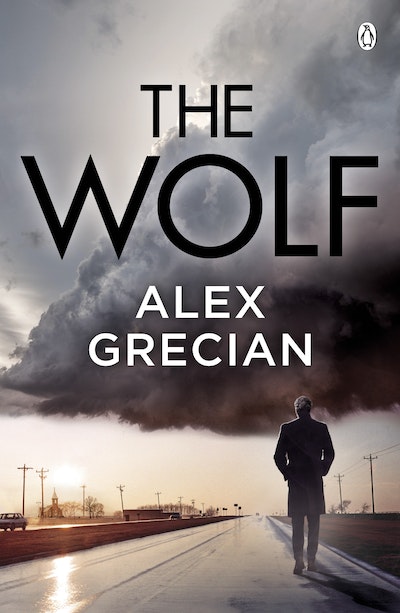- Published: 17 May 2018
- ISBN: 9781405922418
- Imprint: Penguin eBooks
- Format: EBook
- Pages: 416
The Wolf
Extract
AUGUST 1951
He came up from South America by bus. At the border between Mexico and Arizona, he bought a train ticket and rode through the night and well into the next day. A long arc through New Mexico, across the southeast tip of Colorado, and most of the way up through Kansas. He had nothing with him but his clothes and a small overnight bag.
And a new name.
He had been born Rudolph Bormann, but the name on his passport was Rudy Goodman. Rudy. A solid American name.
He kept to himself on the train, but the railroad employed a nurse, and the conductor brought her to Rudy. He had a compartment to himself, with a narrow bed that folded out of the wall. The nurse arrived as the sun was setting and pushed her way in as soon as he answered the knock at his door, overwhelming his objections with her efficiency and her aggressively sympathetic manner. She was a big woman, healthy and strong, with strawberry hair and a fetching overbite. She didn’t tell him her name, and he didn’t ask. She helped him wash up and she stitched the cut above his temple, which had been bleeding into his ear all the way north through Mexico. Six stitches and a sticky bandage. When he thanked her in his pidgin English, she shook her head and smiled.
“Sei still!” she said. Her German was slightly better than his American.
He tried to pay her, took a roll of bills from his pocket, all the money he had with him, and peeled one off the outside. He held it out to her, but she shook her head again.
When she had left, he slid the window open an inch and breathed the soot-filled air. He undressed and lay on his back, listening to the rhythmic chug of the wheels. He allowed himself to relax then, his eyelids growing heavy as the locomotive swayed beneath him, bearing him to freedom.
Later that night the door creaked open and he woke. Yellow light from the passage spilled across him, then disappeared, and a moment later the nurse climbed on top of him in the dark. The bed’s hinges creaked in protest. The scent of rubbing alcohol and cheap perfume filled his nostrils.
“Wie?”
“Sei still,” she said again, her lips brushing against his good ear. When next he woke, a predawn glow filtered through the sheer curtains over the window, casting the compartment in flat shades of purple, and he was alone.
He disembarked in Phillipsburg, just south of the Nebraska border, and stood nervous by the tracks, which cut across a dirt road and disappeared around a curve behind a stand of stunted elm trees. The train chuffed away, taking with it the fragrant nurse and his roll of bills, which he did not miss until much later that day.
It was August, and there were no clouds in the sky, nothing between the sun and the scrubby brown grass but shimmering heat waves. Rudy’s head hurt where the nurse had stitched it, a dull throbbing pain that was almost a noise. After ten minutes, a plume of dust and blue smoke appeared in the distance, coming from the direction the train had gone, and a truck lumbered into sight over a slight rise in the earth. It was the color of mustard, battered and rusty with peeling wooden sides. It stopped in front of him with a bang and a whimper, and Rudy saw that the tailgate was wooden, too, what was left of it. A slat was missing from one side, and yellow paint peeled away from the truck’s hood.
The driver’s-side door creaked open and a man jumped down, came around the front of the truck with his hand out.
“Jacob Meyer,” the man said. He was smiling, short and wiry with thinning hair. Nearing forty but with the jittery energy of a teenager. Rudy liked him right away. They shook hands.
“I am Rudy Goodman.” It was the first time he had said the name aloud, and he said it again, listening to the cadence of it. “Rudy Goodman.” It still sounded authentically American to him.
“Sorry I’m late, Rudy,” Jacob Meyer said. “This ol’ girl picked a hell of a morning not to start. Had to change the plugs again already. I only just changed ’em in June.”
Rudy nodded, but he didn’t understand. He only wanted to be agreeable.
Jacob took Rudy’s overnight bag from him and started for the pickup truck, but stopped and turned and looked at him for a long moment, his head cocked to one side like a dog listening to its master. “You’re really him?”
“Ja.”
“I’ll be damned.” Jacob shook his head and whistled, then turned away again and dropped the bag in the bed of the truck. He hustled to the passenger-side door and held it open, slammed it shut when Rudy was safely in, then ran around to the other side and hopped up into the cab.
“Didn’t turn it off this time, so don’t have to worry about it stalling,” Jacob said. “See, I can learn, can’t I? You just see if I can’t.” He put the truck in gear and it lurched forward with a loud farting noise and another cloud of blue smoke. Jacob grinned at him, and Rudy smiled back. The dull throb in his temple had receded.
“Where are we . . . To where?” These weren’t quite the right words, Rudy knew, but he hoped his meaning was clear enough.
“We got a place fixed up for you out in Paradise Flats,” Jacob said. “You understand me good enough? I can talk German, but it’s better if you use English now. You’ll pick it up.”
Rudy nodded.
“Good, good,” Jacob said. “It ain’t much, the house we got for you, but it’s free and clear. Belongs to Don Veitch, but he moved into an apartment closer to the city when his wife died. Easier on his knees without all them stairs and havin’ to go up and down all the time. Anyway, he don’t live in it now, so it’s yours long as you want it.”
“How many?”
“What? I don’t . . . Oh, how many of us are there? Die Gemeinschaft. Well . . .” Jacob fell silent and stared out the dirty windshield, drummed his hands on the wheel. “I wish it was more,” he said. “Sad to say it’s just seven of us in Paradise Flats, five others besides myself and Don. Used to be more, but folks kinda drifted away over the last couple years, you know? It’s hard to keep ’em here.”
Rudy understood all too well.
The truck picked up speed, bumping over ruts and clumps of hard dried mud. A grasshopper thumped against the glass and disappeared, leaving behind a messy white smear.
Watching out the window, Rudy saw a flash of gray fur among the vegetation.
“I think I saw a wolf,” he said. “In English?”
“They’re called wolves in English, too,” Jacob said. “But there ain’t a lot of those around here. You probably saw a coyote.”
“I think it was a wolf.”
“Fair enough.”
Rudy waited again until Jacob glanced his way. “Jacob,” he said. “This is a good start.”
Rudy Goodman, formerly Rudolph Bormann, assistant administrator of the Mauthausen-Gusen concentration camp, looked out the window of the pickup truck. He looked out across infinite rolling fields and pastures, all the way to the thin black line of the horizon. He was twenty-seven years old that summer, and America stretched out all around him, a land of boundless opportunity
The Wolf Alex Grecian
A mysterious newcomer seeks to lay old crimes to rest in this gripping new thriller
Buy now











